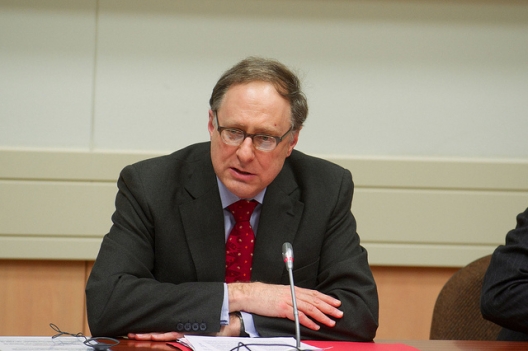 [W]e need NATO. The European Allies need NATO; but so do Canada and the United States. We all need a proven, permanent framework in which we can discuss these issues, find a common strategy, and act upon the decisions we take. In short, I believe we all need an Alliance that is ready to deal with anything the future might throw at us.
[W]e need NATO. The European Allies need NATO; but so do Canada and the United States. We all need a proven, permanent framework in which we can discuss these issues, find a common strategy, and act upon the decisions we take. In short, I believe we all need an Alliance that is ready to deal with anything the future might throw at us.
But I also believe that the transatlantic security burden needs to fundamentally rebalanced, and that European Allies must do more for their own and for our shared defence.
It simply cannot be the same NATO we have today: an Alliance where the US share of total defence expenditure has risen to around 75%; where some European Allies have cut their defence budgets by up to 40 per cent; and where all European Allies continue to depend too heavily on the United States in a range of key capability areas.
We all realise that transatlantic burden-sharing is about more than just defence budgets. European Allies, including Germany, continue to make substantial contributions to NATO-led operations, including in Afghanistan and Kosovo. Several also are making significant contributions to our developing NATO missile defence system. And there is a lot of good European work going on in NATO “Smart Defence” and EU pooling-and-sharing projects.
But I just don’t think last month’s European Council on defence showed enough urgency, nor enough understanding of the critical need for Europe to be able back up its soft power with hard power if it wants to play a meaningful international role. And I also believe it did not show enough understanding of the current political climate in Washington which, although it’s not anti-European, was certainly more pro-European in the past, and more favourably inclined toward international engagement than it is today, after a decade of war.
So in the coming year, European nations are really going to have to step up. European governments must realise that, even though their populations may feel safe, that perceived lack of a threat is self-delusional. They must make the case to their populations that defence still matters. They must demonstrate that they are prepared to hold the line on defence cuts, and hopefully increase spending as their economies improve. And they must show they are serious about working together, about developing long-term procurement and investment programmes, and about ending the fragmentation of their defence industries.
In December EU leaders promised to discuss defence again next year. But we will have a NATO Summit later this year. The Wales Summit will be a further, important opportunity for European nations to demonstrate that they are both willing and able to take on more responsibility for their own security and that of the world in which we live.
Remarks by NATO Deputy Secretary General Alexander Vershbow in Berlin, January 22, 2014.
Image: NATO Deputy Secretary General Alexander Vershbow (photo: NATO)
